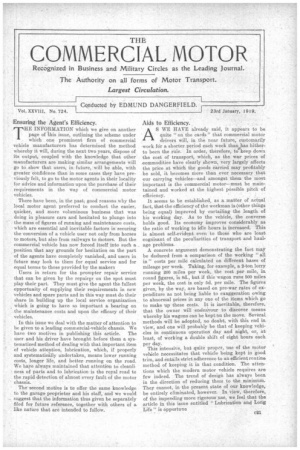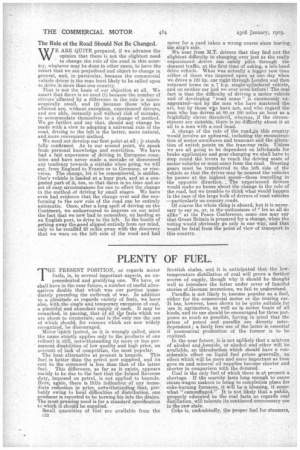Ensuring the Agent's Efficiency.
Page 1

Page 2

If you've noticed an error in this article please click here to report it so we can fix it.
THE INFORMATION which we give on another page of this issue, outlining the scheme under which one prominent firm of commercial vehicle manufacturers has determined the method whereby it will, during the next two years, dispose of its output, coupled with the knowledge that other manufacturers are making similar arrangements will go to show that users, in future, will be able, with greater confidence than in some cases they have previously felt, to go to the motor agents in their locality for advice and information upon the purchase of their requirements in the way of commercial motor vehicles.
There have been, in the past; good reasons why the local motor agent preferred to conduct the easier, quicker, and more voluminous business that was doing in pleasure cars and hesitated to plunge into the mass of figures of running and maintenance costs, which are essential and inevitable factors in securing the conversion of a vehicle user not only from horses to motors, but also from railways to Motors. But the commercial vehicle has now forced itself into such a position that any grounds for hesitation on the part of the agents have completely vanished, and users in future may look to them for equal service and for equal terms to those provided by the makers Users in return for the prompter repair service that can be given by the repairer on the spot must play their part. They must give the agent the fullest opportunity of supplying their requirements in new vehicles and spare parts and in this way must do their share in building up the local service organization . which is going to have so important a bearing on the maintenance costs and upon the efficacy of their vehicles.
In this issue we deal with the matter of attention to he given to a leading commercial-vehicle chassis. We have two motives in publishing this article. The user and his driver have brought before them a systematized method of dealing with that important item of vehicle attention, lubrication, which, if properly and systematically undertaken, means lower running costs, longer life, and better running on the road. We haye always maintained that attention to cleanli . ness of parts and to lubrication is the royal road to the rapid detection of almost every fault of the motor • chassis.
The second motive is to offer the same knowledge to the garage proprietor and his staff, and we would suggest that the information thus given be separately filed for future reference together with others of a . like nature that are intended to follow. Aidsto Efficiency.
AS WE HAVE already said, it appears to be quite "on the cards" that commercial motor drivers will, in the near future, customarily work for a shorter period each week than hashitherto been the rule. In order, therefore, to keep down the cost of transport, which, as the war prices of commodities have clearly shown, very largely affects the price at which the goods carried may profitably be sold, it becomes More than ever necessary that our carrying vehicles—and amongst them the most important is the commercial motor—must be maintained and worked at the highest pOssible pitch of efficiency. .
It seems to be established, as a matter of actual fact, that the efficiency of the workman is (other things being equal) improved by curtailing the length of his working day. As to the vehicle, the converse holds good. Its economy improves considerably as the ratio of working to idle hours is increased. This is almost self-evident even to those who are least cognisant of the peculiarities of transport and haulage problems.
A concrete argument demonstrating the fact may be deduced from a comparison of the working "all in" costs per mile calculated on different bases of mileage per week. Taking, for example, a 2-ton lorry running 200 miles per week, the cost per mile, in round figures, is 8d., but if this wagon runs 500 miles per week, the cost is only 5d. per mile. The figures given, by the way, are based on pre-war rates of expenditure as not being liable to exaggeration owing to abnormal prices in any one of the items which go to make up these costs. It is inevitable, therefore, that the owner will enderivour to discover means whereby his wagons can be kept on the move. Several methods will be adopted, no doubt, with this end in. view, and one will probably be that of keeping vehicles in continuous operation day and night, or, at least, of working a double shift of eight hours each per day. This intensive, but quite proper, use of the motor vehicle necessitates that vehicle being kept in good trim, and entails strict adherence to an efficient routine method of keeping it in that condition. The attentions which the modern motor vehicle requires are few indeed. The trend of design has always been. in the direction of reducing them to the minimum. They cannot, in the present state of our knowledge, be entirely eliminated, however. In view, therefore, of the impending more rigorous use, we feel that the article in this issue entitled " Lubrication and Long Life" is opportune
The Rule of the Road Should Not Be Changed.
WE ARE QUITE prepared, if we advance the opinion that there is net the slightest need to change the rule of the road in this country, whatever may be done in other cases, to have the retort that we are prejudiced and object to change in general, and, in particular, because the commercial vehicle driver is the man least likely to be called upon to drive in more than one country, That is.not the basis of our objection at all. We assert that there is no need (1.) because the number of drivers affected by a difference in the rule is microecopically small, and (2) because those who are affected are, without exception, experienced drivers, and are able, instantly and without risk of mistake, to accommodate themselves to a change of method. We go. further and say that, should any change be made with a view to adopting a universal rule of the road, driving to the left is the better, more natural, and more convenient Method.
We need not develop our first point at all; it stands fully confirmed. As to our second point, aCre speak from personal knowledge and conviction. We have had a fair experience of driving in European countries and have never made a mistake or discovered any tendency towards a mistake when going, we will say, from England to France or to Germany, or viceversa. The change, let it be remembered, is sudden. One's vehicle is landed at a busy Port, and at a congested part of it, too, so that there is no time and no set of easy circumstances for one to effect the change in the• method-of driving by small stages. We have even had evidence that the change over and the conforming to the new rule of the road can be entirely automatic. Once, after a long spell of driving on the Continent., we endeavoured to impress on our mind the fact that we now had to remember, on landing at an English port, to drive to the left. In the bristle of getting away the peed slipped entirely from our mind, only to be -recalled 20 miles away with the discovery that we were on the left side of the road and had
never for a yard taken a wrong course since leaving the ship's side.
We hear from M.T. drivers that they find not the slightest difficulty in changing over just as the really experienced driver can safely pilot through the densest traffic, at the first time of asking, a left-hand drive vehicle. What was actually a bigger test than either of these was imposed upon us one ,day when we drove a 120 hp. car right through London and then returned home on a 7 h.p, single-cylindered vehicle, and on neither car bad we ever been before! The real fact is that the difficulty of driving a motor vehicle and of developing "road sense " is enormously exaggerated—not by the men who have mastered the art, but by those wto have net, and who regard the man who has driven at. SO or 100 miles an hour as a frightfully clever daredevil, whereas, if the circumstances are suitable, there is no -difficulty about it at all to a man with a cool head.
A change of the rule of the roadei.n this country would involve an upheaval, including the reconstruction of motor omnibuses and tramcars arid the alteration of switch points On the tramway rails. Unless we are all going to be dependent on leftslands for brake application and gear changing we shall hate to step round the levers to reach the driving seats of motor vehicles or must enter from the road. Steering gears must be transferred to the left side of the vehicle so that the driver may be nearest the vehicles he passes at the highest speed—those travelling in the opposite direction. , The experienced drivers would make no bones about the change in the rule of the road, but we tremble to think what would happen in the case'of the large bulk of drivers of road vehicles —particularly on country „roads.
Of course the whole thing is absurd, but it is necessary to say so, or, in the enthusiasm of "let us all do alike" at the Peace Conference, some one may say that Great Britain is prepared for a change, when the voting would obviously go only in one way, and that would be fatal from the point of view of transport in this country.






















